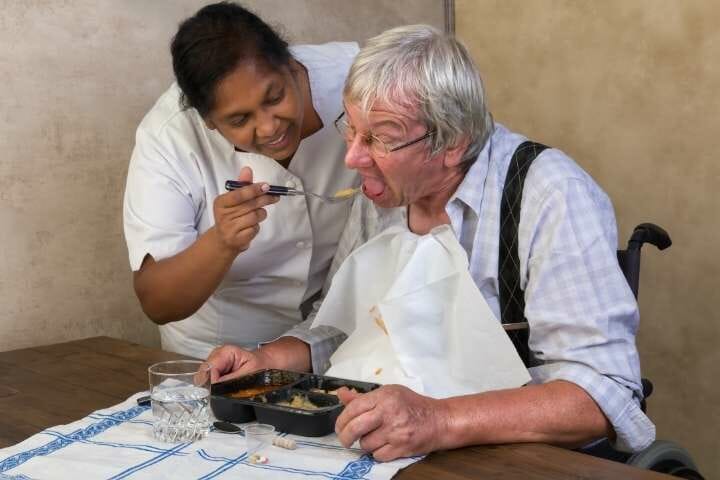Taking care of a loved one with Alzheimer’s can be very difficult – especially as the disease progresses and you know that there’s nothing you can do to help them except make them comfortable.

One of the things that happens when Alzheimer’s starts to progress is that the patient will have difficulty with swallowing and choking on mucous. When that happens it can make it even harder to watch and handle.
Why Do Alzheimer’s Patients Have Troubles With Swallowing?
With Alzheimer’s, a person’s memory is affected and they forget to do most of the tasks we take for granted.
One of these things is swallowing. Often times, as this disease progresses, patients will almost forget how to use the muscles they need to swallow so they don’t know what to do.
This will lead to food and drink sitting in their mouth for longer than it should or they start choking on it and will aspirate into their lungs.
This can lead to an overproduction of mucus and a lot of coughing. The troubles with swallowing and extra mucus go together for those who are in the end stages of Alzheimer’s.
There are seven stages to Alzheimer’s, and as your loved one progresses it may become harder to care for them or watch what is happening to them.
Stage One: No Noticeable Impaired Behavior
This stage may not even be picked up by loved ones because there isn’t really any noticeable difference for most loved ones.
There is only one way in which Alzheimer’s can be diagnosed during this stage, and that is if the patient involved has a PET scan, which is an imaging test that tests how well the brain is functioning. This disease will progress into other stages, but it is very difficult diagnose this disease when it’s in this stage.
Stage Two: Some Very Mild Cognitive Impairment
Patients who are in this stage may still not be showing a lot of signs of cognitive impairment, especially for those people who are around them all the time.

When people are in this phase, it can sometimes be difficult to differentiate the memory loss and if it’s part of old age or Alzheimer’s. Many people will start to lose some memory function as they age, and since the memory loss in this phase is so mild it can really be thought of as old age.
The changes experienced in this stage do not impact everyday life and the majority of people experiencing this will still be able to live independently.
You might like to read: Best Medical Alert System For Alzheimer’s And Dementia Patients
Stage Three: Slow, Steady Decline
By the time a patient gets to this stage, their loved one and medical team will start to be able to notice obvious changes in the cognitive abilities.
The most common issues arise in a person’s ability to organize and plan things out, finding the right words during a conversation and sometimes remembering the names of people they haven’t known for a long time. They may also lose items like keys, money or other small valuable items.
It’s most common when they get to stage three to start showing the more “obvious” signs of Alzheimer’s on standardized memory and cognitive testing.
Stage Four: Moderate Cognitive Impairment
The symptoms mentioned in stage three will start to get worse and much more obvious than they previously were. A patient may start to forget details about themselves like how old they are, where they live, what their own name is and maybe even who their spouse is (if they have one).
Further, they may no longer be able to cook for themselves or even order because they can’t remember what it is they like to eat (or they may even forget to eat altogether).
Patients who are in the stage are recommended to have someone look after them to make sure they are protected from being taken advantage of financially. They should also not be driving because they do not have the cognitive abilities that are required for driving.
Stage Five: Increasing Impairment
During this stage, patients will likely not be able to dress themselves properly or be able to give you simple details about themselves like their own phone number.
They may be able to still bathe and use the bathroom on their own, without any assistance, but it may be a good idea to have someone check in on them to make sure they are taking care of themselves properly and eating healthy, nutritious meals.
At this stage, you may start to notice that your loved one is repeating themselves or asking the same question over and over again. This is because they are confused and really don’t know where they are or what’s going on.
Try to not get frustrated with them – they are genuinely asking these questions. You may want to get some help with how to handle these situations from a caregiver to make sure you are doing the best you can for your loved one.
You might like to read: 40 Inspirational Uplifting Dementia Quotes
Stage Six: Severe Impairment
Patients who are in stage six of Alzheimer’s will be very confused by their environment and surroundings.

Additionally, you may witness some drastic changes in personality or behavior along with not recognizing the faces of people who are closest to them.
During this stage, patients may also lose control of their bladder or bowels, they may just forget that they need to go to the bathroom or they may not know what to do when they actually get into the bathroom.
A person in this stage will need to constantly monitored and supervised as they could really hurt themselves. They usually will not know where they are or what they name is, and will need help with getting dressed, bathing and reminders to eat and go to the bathroom.
In most cases, people in this phase will be living in a nursing home or have full-time live in care at their home. They need around the clock care and cannot be left alone.
They will probably continue to repeat themselves and ask continuous questions. A lot of the time, loved ones will not be prepared to care for someone with this stage of Alzheimer’s so they will turn to professionals to help provide proper care for their loved one.
Stage Seven: End Stage Alzheimer’s
This is the final stage of this disease, marked by the need for assistance with all daily activities and the inability to speak any kind of phrases except for a few words.
At this stage, the person will no longer be able to tell you if they are hungry or thirsty, nor are they aware of who you are even if you are one of their closest loved ones.
They will require complete assistance with everything in their life and will need 24 hour a day care, most likely from a professional. This stage means the illness is coming to an end and your loved one will likely be in palliative care or hospice.
You might like to read: Best Mucus Suction Pump For Adults
Can You Help Your Loved One With Advanced Stage Alzheimer’s?
When you notice that your loved one is starting to choke more often on their food or having a lot more trouble with swallowing it’s natural to want to do everything you can to help them.
Unfortunately, you can’t do much except keeping them comfortable. You can help feeding them so that they remember to eat and drink. You may need to feed them in a slower manner, with smaller bites and reminding your loved one to chew the food before the try to swallow.

In Summary
Extra mucus is part of having Alzheimer’s, and as the stages of this disease progress then you will notice they have more and more of it. It may appear as a “wet” sound in their lungs when they breathe, almost like a crackling.
You will probably want to approach professional caregivers so that you know your loved one is being taken care of. These caregivers will have much more experience and being trained in caring for Alzheimer’s so they know how to handle the decline of this disease.
If you want, you can take courses on CPR and First Aid so that if your loved one starts choking or cannot stop coughing you have some experience in how to handle the situation before calling in medically trained professionals.
Watching your loved one go through this is going to be one of the hardest things you will ever do. Making them comfortable and being there for them will mean a lot to them. Trying to fix it, or reason with them may not work – especially towards the end of the disease. As you see them go through each of the seven stages of this disease, they may get further away from the person you remember them to be.
Try to hold their hand and sit with them, enjoy their company as much as you can. Taking care of them in small ways, like wiping their mouth and helping them to cough up any mucus they may have. You can also purchase one of the baby tools that is used to remove mucus from an infant’s nose when they can’t blow their nose.
